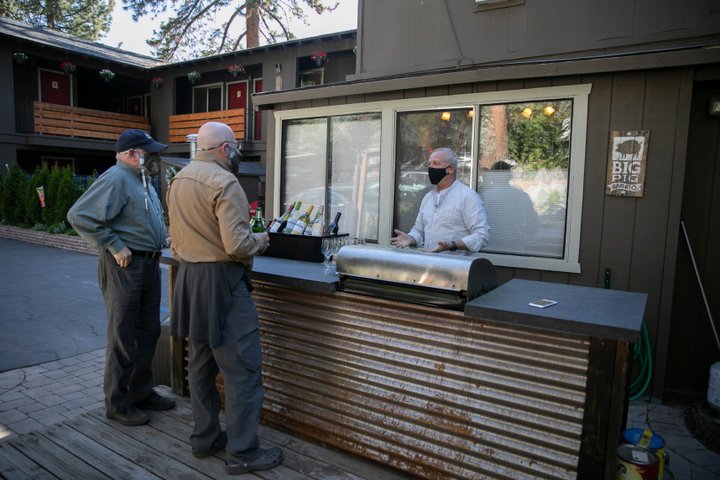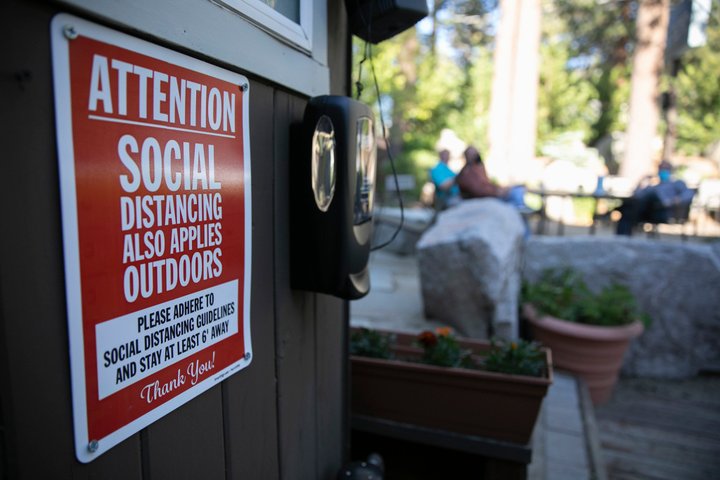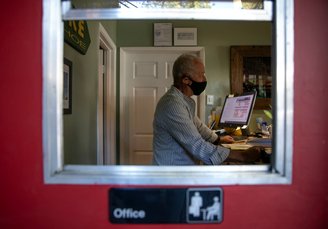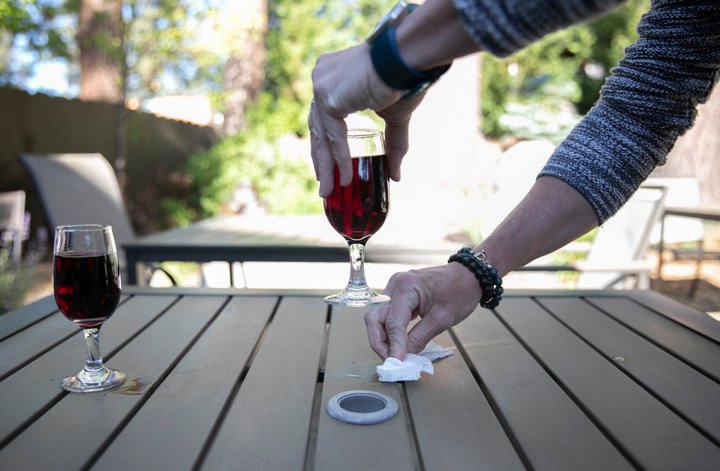
Bill Hirsch, co-owner of the 7 Seas Inn in South Lake Tahoe, wears a mask while greeting guests after the stay-at-home order was lifted in the area. Photo by Anne Wernikoff for CalMatters
###
A week ago, Isabel Rasmussen and her husband drove over three hours from their home in South San Francisco to South Lake Tahoe. They stayed at the 7 Seas Inn nestled in the Sierra Nevada mountains for two nights.
“I was nervous about staying in a larger hotel,” Rasmussen said. She and her husband picked the 16-bedroom inn rather than a large resort because they didn’t want to come into contact with a lot of people who might spread the coronavirus.
A day earlier, staying at the inn would have been impossible. Like hotels all over California, it had been closed for three months due to the statewide stay-at-home order.
On June 12, many hotels, restaurants, wineries and more were allowed to reopen under state guidelines. The next day, the 7 Seas Inn started welcoming guests back.
Now some Californians are slowly emerging from their homes, and traveling to other parts of the state for short vacations and road trips.
Many epidemiologists warn that taking leisure trips could cause COVID-19 infections to surge. State health department guidelines still recommend against all but local, essential travel.
Eyal Oren, an epidemiologist at San Diego State University, emphasized that people need to be especially aware if they are traveling from an area with a lot of infections to one with few or no cases because they can spread the virus.
While Oren recognizes the need to reopen parts of the state’s economy, he worries that some counties are reopening too much, too soon. “I do think it’s happening in a fairly uncontrolled fashion,” he said. “It’s going to be very difficult to keep up with infections.”
If cases do spike, health officials won’t know for at least another week, or two weeks from the June 12 reopening.
“We’re going to have to see what happens,” saId Dr. Lee Riley, an epidemiologist and infectious disease specialist at the University of California, Berkeley School of Public Health.
In April, more than 7.7 million jobs were lost nationwide in the hotel and leisure industries, including 200,000 in California plus another estimated 400,000 indirectly related to hotels, according to the American Hotel and Lodging Association. The industry is on the “brink of collapse” and 2020 is expected to have the lowest hotel occupancy ever recorded, the association said.
In order to open up again, hotels are taking precautions outlined in state guidelines for their industry. Employees are required to wear masks, provide temperature screenings before and after each shift and frequently clean rooms and common areas. Gov. Gavin Newsom on Thursday ordered masks to be worn at all times, with a few exceptions, in public.

Guests are seated six feet apart on the patio during the evening reception at 7 Seas Inn in South Lake Tahoe. Photo by Anne Wernikoff for CalMatters
“The industry has every incentive to keep customers safe,” said Caroline Beteta, president and chief executive officer of Visit California, a nonprofit organization that works with the California Department of Tourism to promote travel.
Last month, in time for Memorial Day weekend, the city of South Lake Tahoe told people to stay away, warning that it would issue $1,000 fines to those who traveled to the area for nonessential reasons. The warning was lifted a week later. In the Tahoe area, 62 people have tested positive for the virus.
Bill Hirsch, co-owner of 7 Seas Inn with his wife, was eager to reopen. Shutting down his hotel in mid-March meant losing more than $100,000 worth of business, he said.
“We lost a solid month and a half of ski season,” he said. He said emergency loans and grants they received through the Small Business Administration’s Paycheck Protection Program saved his business. Even with the reopening, he fears that the inn still may not break even this year.
Hirsch said he has seen people in the city who weren’t wearing masks, were in close proximity to each other and seemed to act as if the pandemic were over. “That has concern for me,” he said. “I fear that.”
What he fears more than anything is a second wave, which could mean the end of his inn. If another shutdown happens, he’s not sure it’ll survive.
The state has released health guidelines for every industry that is allowed to reopen, including hotels and restaurants.
But state guidance on whether people should travel has been unclear.
California is in stage two of its reopening, which according to the Resilience Roadmap, only allows for essential services and limited other business operations. The guidelines also say to “limit time outside the home” and travel only when absolutely necessary. Even stage three guidelines direct Californians to travel only locally.
Nothing in the state guidelines appears to prevent people from traveling.
The California Department of Public Health said in an email that Californians should still “avoid travelling long distances for vacations or pleasure as much as possible” and they are “encouraging people to stay close to home.”
Fifty out of California’s 58 counties by June 12 had met state metrics that suggest stabilization of hospitalizations and infections. That meant they were allowed to move through the second stage of reopening and open some businesses associated with the third stage. Another two counties have since met the guidelines.
San Diego Country, which has many tourist attractions, is among the counties that have reopened tourism-related businesses, with the safety restrictions.
When asked about travel at a recent press conference, Dr. Wilma Wooten, the county’s public health officer, said that “of course, we are always concerned” about a rise in cases, especially associated with lifting restrictions. She also said she would not be surprised if the county saw an uptick in cases as a result.
“If things do go awry, then we would have to dial back down,” Wooten said. “I know that no one wants to do that.”
Other counties, including Marin, Alameda and San Francisco, have not qualified for the variance allowing them to reopen many businesses.
“We’ve kind of been the hot spot in the Bay Area,” said Dr. Erica Pan, Alameda County’s public health officer.
She said that due to a recent increase in cases and hospitalizations, easing restrictions on nonessential travel is a ways off in Alameda County.
Dr. Matt Willis, public health officer for Marin County, agreed. “We saw nothing like the surges we anticipated,” he said, adding that nevertheless, Marin still needs to be careful.
Alicia Goldstein, a retired public health nurse from Oakland, recently took a trip to Pacific Grove, near Monterey. Goldstein describes herself as a “very, very active senior” in her 70s, and said she and her husband took the trip mainly to go hiking. After some reassurances from a friend, they decided they could safely do so while social distancing.
Goldstein and her husband stayed at a small Best Western hotel, where the hotel staff had taken precautions by cleaning, mask-wearing and social distancing. She said she doesn’t have any particular health concerns, although her husband is diabetic. Health officials say diabetes is one of the risk factors that affects people with the coronavirus.
While not everyone she saw on her trip was wearing a mask, Goldstein said she felt fairly safe while she was there.

Guests are seated six feet apart on the patio during the evening reception at 7 Seas Inn in South Lake Tahoe. Photo by Anne Wernikoff for CalMatters
Rasmussen, the 7 Seas Inn guest, said that hotel staff always wore masks, cleaned and sanitized all rooms and implemented social distancing as much as possible. She said that it was about fifty-fifty in terms of guests at the inn and in town who followed the guidelines like social distancing.
The inn’s daily evening reception takes place outside at carefully-spaced tables, which have reduced the normal seating by half. Reusable items like magazines were eliminated in rooms, and guests from only a single room at a time can use the hot tub, Hirsch said.
The inn also switched its breakfast program from a restaurant-style service to picnic baskets that are ordered in advance and disinfected each night. Rasmussen said the baskets were not only a good precaution, but a thoughtful and charming touch.
Rasmussen said her family will soon be moving to the Lake Tahoe area, so she and her husband were meeting with real estate agents. Even so, they were glad of the excuse to take a trip. But she said they wouldn’t have stayed at a large hotel.
Once people become accustomed to being able to do more, it will be hard to get them to stay home again if the virus surges, Marin County’s Willis said.
“I don’t think we should have a simplistic assumption that it’s just sort of an on-off switch,” he said. “It’s a lot harder to put that genie back in the bottle.”

A guest cleans a table with a disinfectant wipe during the meet and greet at 7 Seas Inn. Photo by Anne Wernikoff for CalMatters
###
CALmatters.org is a nonprofit, nonpartisan media venture explaining California policies and politics.
CLICK TO MANAGE